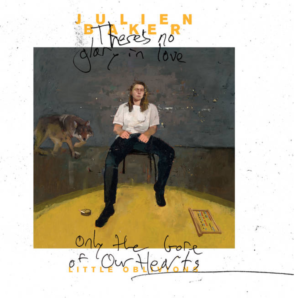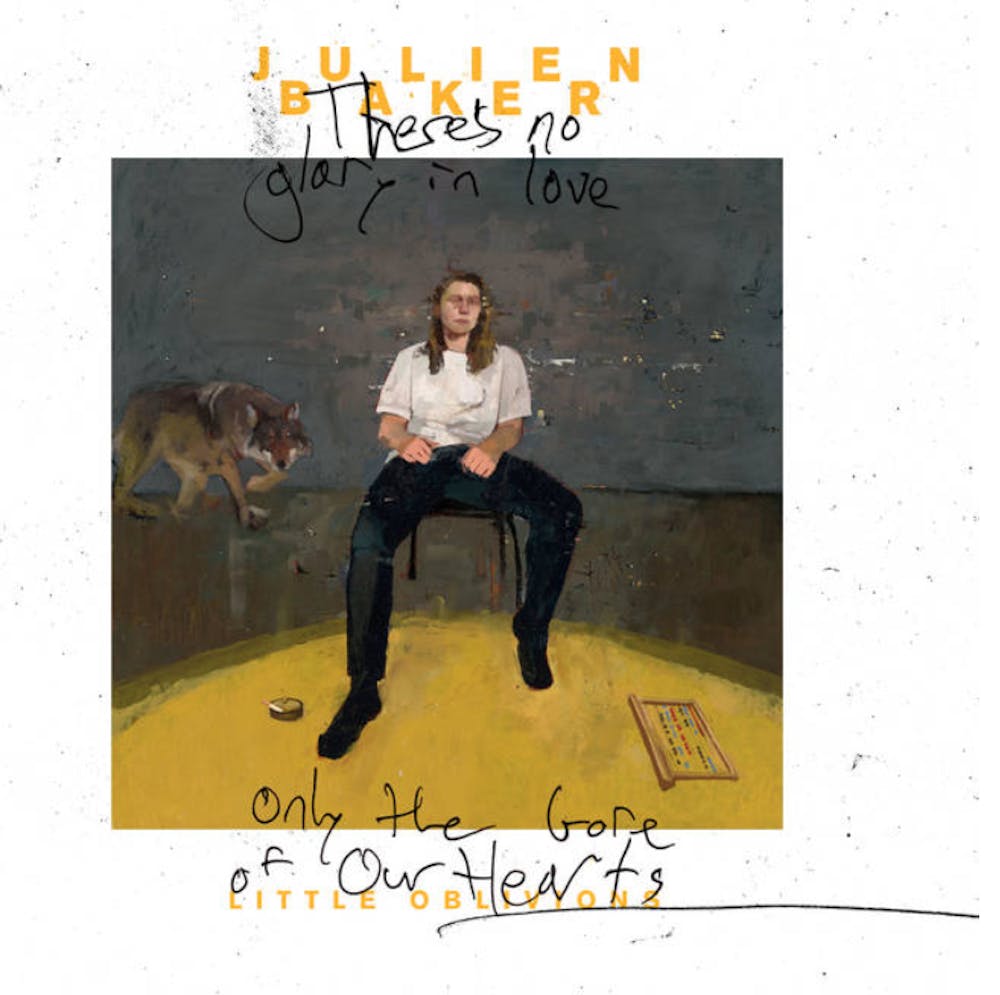By Julia Landi
Assistant Music Director at WTSR
In her third album “Little Oblivions,” singer-songwriter Julien Baker expands upon her musical sound while still delivering the emotional gut-punch fondly associated with her music.
This week, the Music Staff at the College’s WTSR voted Julien Baker’s most recent release as the Album of the Week. The other contenders for “Album of the Week” were “Tyron” by Slowthai, “Electric Century” by Electric Century, and “An Overview of Phenomenal Nature” by Cassandra Jenkins. Baker’s album stood out, though, for her strength as a songwriter to create something beautiful, compelling, and — weirdly enough — hopeful even out of the darkest moments.

Baker has been a bit of an indie darling since 2015, when her debut album, which she recorded at 19 years old, was released through 6131 Records. The album “Sprained Ankle” gained critical acclaim for her songwriting as Baker has a particular knack for delivering utterly heartbreaking lyrics in such a beautiful way. Now 25, Baker still compels her listeners with her emotional lyrics, with some of her most self-critical lyrics to date. What makes “Little Oblivions” stand out from her two previous releases, though, is the full band sound that starkly contrasts Baker’s previous bare bones singer-songwriter releases.
Her second single for this album, “Hardline,” opens the track with blaring organ chords that fade into Baker’s soft, confessional vocals. Baker tells the listener about a self destructive spiral she’s fallen down, with the opening lyrics: “blacked out on a weekday/still, something that I’m trying to avoid.” Through the verse, the song slowly builds up instrumentally and emotionally, with the guitar picking up as Baker pleads for “forgiveness in advance.”
Baker then digs into herself, singing, “that way I can ruin everything/when I do, you don’t get to act surprised/when it finally gets to be too much/I always told you you could leave at any time.” Baker owns up to her self destructive tendencies, begging this person she’s singing to not defend her because “it’s just the kind of thing that I enjoy.” Baker pleads to this person to draw the titular “Hardline,” telling them: “when I cross it, it’s the third time.” The song reaches its emotional peak at the end as Baker sings, “it isn’t black and white/what if it’s all black baby, all the time?” The guitar and drums pick up like a full blown rock song as Baker repeats the haunting phrase “all the time.”
Another standout point on the album is the fourth track “Relative Fiction.” The song opens with a hypnotic guitar as Baker describes herself as a spectacle to somebody else, “midnight, you could see me dangling/glow like a cherry falling.” The person Baker sings to seems to be someone special to her, as she sings “you’re the only one I’ll wait around for,” as the instrumentation picks up and Baker’s layered vocals detail what a night out looks like for her and this person. The echoing instrumentation gives way for gentle and emotive piano keys as Baker shifts the tone of the song, telling her companion: “cause if I didn’t have a mean bone in my body/I’d find some other way to cause you pain.”
The instrumentation swells as Baker builds up to her confession: “I guess I don’t mind losing my conviction/if it’s all relative fiction anyway.” In the outro verse, while the instrumental feels the fullest it's been, Baker herself seems more isolated as she cries, “cause I don’t need a savior/I need you to take me home.” She appears lost after giving up her convictions, but there appears to be some solace at the end of her song as her voice seems most confident as she sings, “I’ve got no business praying/I’m finished being good/Now I can finally be okay/and not the way I thought I should.”
While this album was notable for being Baker’s first full band album, one of the final tracks, “Song in E,” is a stripped back and emotionally devastating piano piece more akin to Baker’s sophomore LP “Turn Out The Lights.” Baker holds nothing back in this track, with the opening lines: “I wish that I drank because of you/And not only because of me.” Despite how much she desires to blame another person for her pain and self destructive coping mechanisms, she is forced to accept that she is the one to blame.
Furthermore, she has to accept that her troubles are causing others pain, as she sings in the next verse: “When you heard my name/You could be angry and have a good reason to be.” This track showcases Baker’s emotive vocal range, which is harder to hear in the other tracks where Baker’s voice feels lower. The last verse is a signature Baker emotional gut punch as she pleads to someone “I wish you would come over/not to stay, just tell me that I was your biggest mistake to my face/and then leave me alone in an empty apartment/face down on the carpet.”
The song is brutal honesty at its best. Baker’s desperation for someone else, someone she seems to love, to tell her all the pain she’s caused is both heartbreaking and strangely respectable. The song concludes with her singing “I wish you would hurt me/it’s the mercy I can’t take,” as she feels the harm she’s done means she should not be forgiven.
While so much more could be said about Baker’s album, such as the backing vocals by fellow singer-songwriters Lucy Dacus and Phoebe Bridgers, the best way to experience the album is to listen to it all the way through, experiencing every bit of love, pain, and hope that Baker puts into her music.







